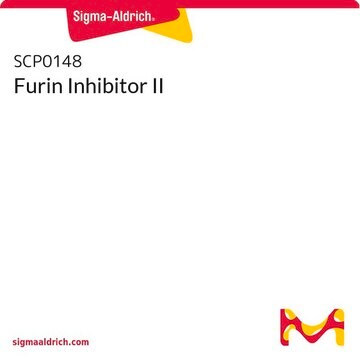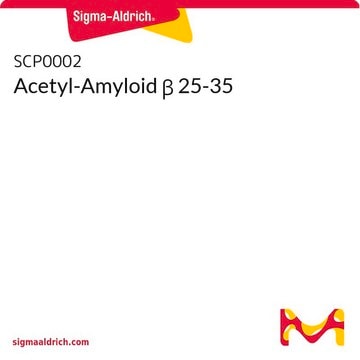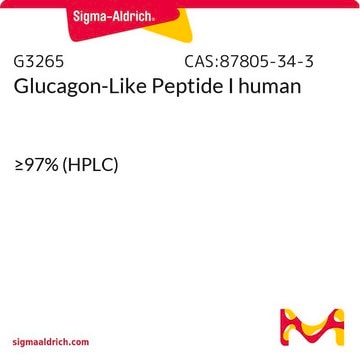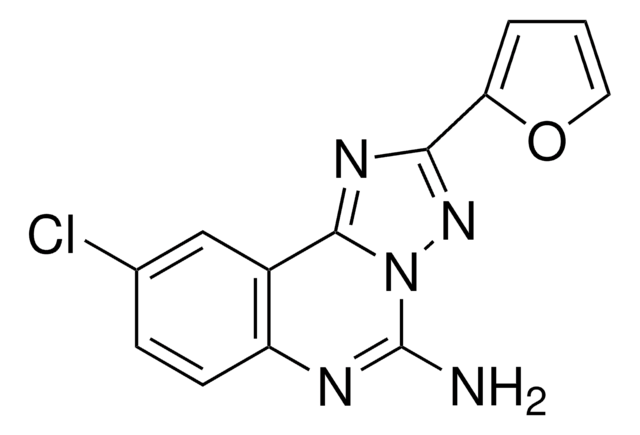All Photos(1)
About This Item
Empirical Formula (Hill Notation):
C42H75N13O12
Molecular Weight:
954.12
UNSPSC Code:
12352209
NACRES:
NA.32
Recommended Products
Assay
≥95% (HPLC)
form
lyophilized
composition
Peptide Content, ≥70%
storage condition
protect from light
storage temp.
−20°C
Amino Acid Sequence
Gly-Ser-Asn-Lys-Gly-Ala-Ile-Ile-Gly-Leu-Gly
Application
Amyloid β (Aβ) refers to peptides derived from Amyloid precursor protein that vary in length from 36-43 amino acids. Aβ(s) peptides, their peptide fragments and mutated fragments are used to study a wide range of metabolic and regulatory functions including activation of kinases, regulation of cholesterol transport; function as a transcription factor, and regulators of inflammation. Aβ(s) peptides and their peptide fragments are also used to study oxidative stress and mechanisms of protein cross-linking in the context of diseases such as Alzheimer′s disease and neurodegeneration.
Storage Class Code
11 - Combustible Solids
WGK
WGK 1
Flash Point(F)
Not applicable
Flash Point(C)
Not applicable
Choose from one of the most recent versions:
Certificates of Analysis (COA)
Lot/Batch Number
Don't see the Right Version?
If you require a particular version, you can look up a specific certificate by the Lot or Batch number.
Already Own This Product?
Find documentation for the products that you have recently purchased in the Document Library.
Houttuyniae Herba protects rat primary cortical cells from Aμ25-35-induced neurotoxicity via regulation of calcium influx and mitochondria-mediated apoptosis.
Park H, Oh MS.
Human & Experimental Toxicology (2012)
L Millucci et al.
Current protein & peptide science, 11(1), 54-67 (2010-03-06)
Amyloid-beta (Abeta) peptide is commonly found in human Alzheimer's disease (AD) brain and is the main component of Alzheimer amyloid plaques. The predominant forms of Abeta in the human brain are Abeta(1-40) and Abeta(1-42), but Abeta(25-35) fragment, physiologically present in
Yan-Fang Xian et al.
Cellular and molecular neurobiology, 32(3), 353-360 (2011-11-02)
Beta-amyloid peptide (Aβ), a major protein component of senile plaques, has been considered as a critical cause in the pathogenesis of Alzheimer's disease (AD). Modulation of the Aβ-induced neurotoxicity has emerged as a possible therapeutic approach to ameliorate the onset
Min Young Um et al.
Neurochemical research, 37(4), 689-699 (2011-12-08)
We have investigated the neuroprotective effect of sesaminol glucosides (SG) in SK-N-SH cells. SG prevented apoptotic cell death induced by Aβ₂₅₋₃₅. In parallel, SK-N-SH cells exposed to Aβ₂₅₋₃₅ underwent oxidative stress as shown by the elevated level of intracellular ROS
Our team of scientists has experience in all areas of research including Life Science, Material Science, Chemical Synthesis, Chromatography, Analytical and many others.
Contact Technical Service![[Ala28]-Amyloid β 25-35 ≥95% (HPLC)](/deepweb/assets/sigmaaldrich/product/images/306/938/dd9f7c72-cfca-4ea3-8e10-a7a2a7994639/640/dd9f7c72-cfca-4ea3-8e10-a7a2a7994639.jpg)








